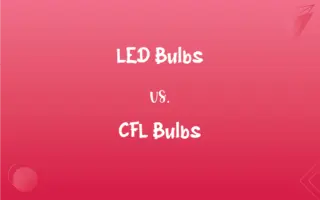Impetigo vs. Herpes: What's the Difference?
Edited by Aimie Carlson || By Janet White || Published on February 27, 2024
Impetigo is a bacterial skin infection, often with honey-colored crusts, while herpes is a viral infection causing painful blisters or ulcers.

Key Differences
Impetigo is a common bacterial infection affecting the skin, primarily seen in children. It is characterized by red sores that burst and develop honey-colored crusts. Herpes, in contrast, is a viral infection that presents as grouped blisters on a red base, often painful, and can occur anywhere on the body, including the genitals and mouth.
The causative agent of impetigo is usually Staphylococcus aureus or Streptococcus pyogenes. This infection is highly contagious and spreads through direct contact. Herpes, on the other hand, is caused by herpes simplex virus (HSV), and transmission occurs through direct contact with infected body fluids or lesions.
Treatment for impetigo involves topical or oral antibiotics, aimed at eradicating the bacterial infection. In contrast, herpes is managed with antiviral medications, as antibiotics are ineffective against viral infections like HSV.
Impetigo typically resolves without long-term effects, though it may leave temporary skin discoloration. Herpes is a lifelong condition, with potential for recurrent outbreaks triggered by factors like stress or illness.
Impetigo is primarily a concern due to its highly contagious nature, especially in schools and daycare settings. Herpes, with its recurrent and often painful outbreaks, poses a more significant concern regarding quality of life and emotional distress, especially in cases of genital herpes.
ADVERTISEMENT
Comparison Chart
Causative Agent
Bacteria (Staphylococcus or Streptococcus)
Virus (Herpes Simplex Virus)
Symptoms
Red sores, honey-colored crusts
Painful blisters or ulcers
Contagiousness
Highly contagious, spreads easily
Contagious, spreads through contact
Treatment
Antibiotics
Antiviral medications
Long-term Effects
Usually none, temporary skin discoloration
Lifelong condition with recurrent outbreaks
ADVERTISEMENT
Primary Affected Group
Mainly children
People of all ages, including adults
Transmission
Direct contact with infected skin
Direct contact with infected fluids or lesions
Impetigo and Herpes Definitions
Impetigo
Impetigo is a bacterial skin infection characterized by red sores.
The child developed impetigo after scratching a bug bite.
Herpes
It's caused by the herpes simplex virus.
Herpes simplex virus type 1 is commonly responsible for cold sores.
Impetigo
This infection is caused by either Staphylococcus aureus or Streptococcus pyogenes.
Antibiotics were prescribed to treat the child's impetigo, caused by Staphylococcus aureus.
Herpes
Herpes can be oral or genital, with recurrent outbreaks.
He manages his genital herpes with regular antiviral medication.
Impetigo
It's a contagious infection commonly seen in children.
Due to a case of impetigo in the classroom, parents were advised to watch for symptoms in their kids.
Herpes
There's no cure for herpes, but symptoms are treatable.
She uses a topical cream to alleviate the symptoms of her herpes outbreak.
Impetigo
Impetigo manifests as blisters that burst and form a honey-colored crust.
The doctor diagnosed the rash as impetigo because of its distinctive crusts.
Herpes
Herpes spreads through direct contact with infected areas.
The herpes virus was transmitted during intimate contact.
Impetigo
Impetigo is treatable with topical or oral antibiotics.
After applying antibiotic cream, the impetigo on her arm began to improve.
Herpes
Herpes is a viral infection causing blisters or sores.
The patient was diagnosed with oral herpes after presenting with mouth ulcers.
Impetigo
A contagious skin infection, usually of children, that is caused by staphylococcal or streptococcal bacteria and is marked by superficial pustules and thick yellow crusts, commonly on the face.
Herpes
Any of several viral infections marked by the eruption of small vesicles on the skin or mucous membranes, especially herpes simplex.
Impetigo
(pathology) A contagious bacterial skin disease forming pustules and yellow crusty sores, chiefly on the face and hands. It is common in children and infection is often through cuts or insect bites.
Herpes
(medicine) A viral infection, caused by Human alphaherpesvirus 1 and Human alphaherpesvirus 2, marked by painful, watery blisters in the skin or mucous membranes or on the genitals.
Impetigo
A cutaneous, pustular eruption, not attended with fever; usually, a kind of eczema with pustulation.
Herpes
An eruption of the skin, taking various names, according to its form, or the part affected, caused by a herpesvirus infection; especially, an eruption of vesicles in small distinct clusters, accompanied with itching or tingling, including shingles, ringworm, and the like; - so called from its tendency to creep or spread from one part of the skin to another.
Impetigo
A very contagious infection of the skin; common in children; localized redness develops into small blisters that gradually crust and erode
Herpes
Viral diseases causing eruptions of the skin or mucous membrane
Herpes
Any of the animal viruses that cause painful blisters on the skin
FAQs
What is impetigo?
A bacterial skin infection, typically with red sores and honey-colored crusts.
What causes herpes?
Herpes is caused by the herpes simplex virus.
Is impetigo contagious?
Yes, impetigo is highly contagious and spreads through direct skin contact.
Can herpes be cured?
No, herpes is a lifelong condition with no cure, but treatments are available to manage symptoms.
What are the symptoms of impetigo?
Symptoms include red sores that burst and form a honey-colored crust.
Are there different types of herpes?
Yes, primarily herpes simplex virus type 1 (oral herpes) and type 2 (genital herpes).
How can impetigo be prevented?
Good hygiene and avoiding close contact with infected individuals can help prevent impetigo.
How is impetigo treated?
Impetigo is treated with topical or oral antibiotics.
Can adults get impetigo?
Yes, while more common in children, adults can also contract impetigo.
Are there vaccines for herpes?
No, there are currently no vaccines for herpes simplex virus.
Can impetigo be mistaken for other skin conditions?
Yes, impetigo can be confused with conditions like eczema or herpes.
How is herpes transmitted?
Herpes is transmitted through direct contact with infected body fluids or lesions.
Is impetigo a serious condition?
It's usually not serious but needs treatment to prevent spread and complications.
What triggers herpes outbreaks?
Stress, illness, and sun exposure are common triggers for herpes outbreaks.
How long does a herpes outbreak last?
Outbreaks typically last 2-4 weeks, but the duration can vary.
Can herpes lead to other health issues?
Yes, especially in immunocompromised individuals, it can cause complications.
Can impetigo leave scars?
Rarely, if impetigo is severe or not properly treated, it may leave scars.
Can impetigo spread to other body parts?
Yes, impetigo can spread to other areas of the skin through scratching or contact.
Is genital herpes always transmitted sexually?
Mostly, but it can also be transmitted via non-sexual contact with the genital area.
Can herpes be asymptomatic?
Yes, many people with herpes may not show symptoms but can still transmit the virus.
About Author
Written by
Janet WhiteJanet White has been an esteemed writer and blogger for Difference Wiki. Holding a Master's degree in Science and Medical Journalism from the prestigious Boston University, she has consistently demonstrated her expertise and passion for her field. When she's not immersed in her work, Janet relishes her time exercising, delving into a good book, and cherishing moments with friends and family.
Edited by
Aimie CarlsonAimie Carlson, holding a master's degree in English literature, is a fervent English language enthusiast. She lends her writing talents to Difference Wiki, a prominent website that specializes in comparisons, offering readers insightful analyses that both captivate and inform.






































































